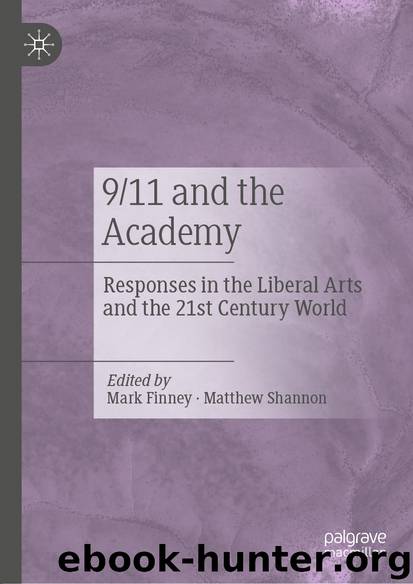911 and the Academy by Mark Finney & Matthew Shannon

Author:Mark Finney & Matthew Shannon
Language: eng
Format: epub
ISBN: 9783030164195
Publisher: Springer International Publishing
6.3 How Can We Go Back to Laughing? Comedy, Satire, and “Fake News”
One important aspect that academia did not notice right away was the contradictory nature of 9/11 and its effects on the media audience. In fact, “9/11 [also] provoked counternarratives and political dialogues. In particular, 9/11 made people aware of new prospects for communication in a rapidly changing media environment” (Spigel 2004, 260). Confirming this line of thinking, Birkenstein, Froula, and Randell champion the “significance of popular culture” in the years following 9/11 and how it has “become a creative space in which nuanced participatory debates take place among public citizens rather than with (and between) our elected representatives in Washington, DC” (2010, 2). Both Spigel and the three editors of Reframing 9/11 highlight how post-9/11 media have been able to provide a critical forum and a public sphere for (democratic) debates, an idea that brings evidence against the monolithic theses about media as systematically promoting the rhetoric of the “war on terror.”
Critics and commentators of popular culture failed to examine the complex and multi-layered consequences of 9/11 in the media, and “summarily declared that the attacks on the Pentagon and World Trade Center had brought about the ‘end of irony.’” (Spigel 2004, 236). Contradicting this thesis and exploring adult cartoons like Family Guy and South Park, Matthew Hughey and Sarah Muradi discuss how both programs represent significant examples of post-9/11 television, more specifically of “how post-9/11 culture (re)produces political comedy in ways that blur the line between satire and that which is satirized” (Hughey and Muradi 2009, 208). Thus, adult cartoons generally testify to how 9/11 did not bring about the end of irony, but instead push forward a new kind of irony and satire that “rely upon, and simultaneously produce, a blurring of the line between ‘authentic’ and ‘satirical’ racism/nationalism” (Hughey and Muradi 2009, 210). Animated series, and especially those targeting an adult audience, have become the flagship of counterhegemonic narratives of and for post-9/11 American television, while simultaneously being very much part of the consumer capitalist system they question and mock (through DVD sales, merchandising, and outsourcing). Matt Sienkiewicz and Nick Marx take the industrial analysis of adult cartoons a step further, discussing how their “aggressive use of incendiary identity-based humor are well-suited to the economic goals of convergence-era television” (Sienkiewicz and Marx 2014, 105).
Someone who had a hard time putting a smile on his face in the aftermath of 9/11 was The Daily Show host Jon Stewart who, in his first monologue after the attacks, apologized to his audience for failing at what he normally does best (and what he is paid to do):I’m sorry to do this to you. It’s another entertainment show beginning with an overwrought speech of a shaken host and television is nothing if not redundant. So, I apologize for that, it’s something that unfortunately we do for ourselves so we can drain whatever abscess is in our hearts and move on to the business of making you laugh, which we
Download
This site does not store any files on its server. We only index and link to content provided by other sites. Please contact the content providers to delete copyright contents if any and email us, we'll remove relevant links or contents immediately.
Spare by Prince Harry The Duke of Sussex(5197)
Navigation and Map Reading by K Andrew(5158)
Tuesdays with Morrie by Mitch Albom(4784)
Machine Learning at Scale with H2O by Gregory Keys | David Whiting(4313)
Cracking the GRE Premium Edition with 6 Practice Tests, 2015 (Graduate School Test Preparation) by Princeton Review(4294)
Never by Ken Follett(3957)
Goodbye Paradise(3810)
What It Really Takes to Get Into Ivy League and Other Highly Selective Colleges by Hughes Chuck(3760)
Fairy Tale by Stephen King(3399)
Harry Potter and the Prisoner of Azkaban (Book 3) by J. K. Rowling(3360)
Pledged by Alexandra Robbins(3179)
Kick Ass in College: Highest Rated "How to Study in College" Book | 77 Ninja Study Skills Tips and Career Strategies | Motivational for College Students: A Guerrilla Guide to College Success by Fox Gunnar(3131)
Reminders of Him: A Novel by Colleen Hoover(3121)
A Dictionary of Sociology by Unknown(3085)
Sapiens and Homo Deus by Yuval Noah Harari(3071)
The Social Psychology of Inequality by Unknown(3031)
Graduate Admissions Essays, Fourth Edition: Write Your Way into the Graduate School of Your Choice (Graduate Admissions Essays: Write Your Way Into the) by Asher Donald(2922)
Will by Will Smith(2920)
Zero to Make by David Lang(2785)
